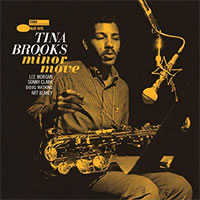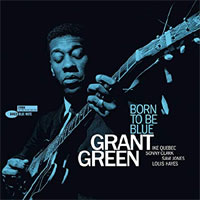Tina Brooks • Minor Move
Grant Green • Born To Be Blue
he Music Matters series of Blue Note LP reissues took the audiophile world by storm with its fanaticism for offering the best in sound, music and packaging. Wanting to create a product of similar perfection to come out in conjunction with Blue Note’s 80th anniversary, Don Was, Blue Note's president, approached Music Matters partner Joe Harley and asked him if he would be interested in heading a reissue program that would come within spitting distance of the renowned series Joe had a hand in producing. Harley had some questions before he agreed to take on the project, but when Was gave him the green light to create the Tone Poet series, Harley was on board. Throughout 2019, Harley and Blue Note released 16 titles, all on 180-gram vinyl, completely analog (where available), remastered at Cohearent Audio, pressed at RTI and presented in top-quality sleeves. These titles range from Blue Note dates that Harley just felt needed to be reissued, to dates Blue Note left in the can for years until they were unearthed in the mid-1980s, and dates Blue Note never issued (but should have), up through sessions from any and all catalogues that now reside under the Blue Note umbrella. Harley spiced up the first round of reissues with a couple of recent Blue Note recordings as well as titles pulled from the World Pacific and Solid-State catalogues. The two titles covered here are both Blue Note dates, with the 1958 recording by Tina Brooks never being officially released and the 1961 Grant Green session not seeing the light of day until 1985. Minor Move was Tina Brooks's first date as leader -- he had already impressed Blue Note owner and president Alfred Lion with his work on dates by Jimmy Smith and Kenny Burrell. Brooks received a stacked lineup for his debut, with Lee Morgan, Sonny Clark, Doug Watkins and Art Blakey as band mates. Brooks was only 26 when he entered Rudy Van Gelder’s studio to lead this session. By all accounts, Brooks was a shy, reserved person; being leader over such established jazz stars as Morgan, Watkins and especially Blakey would put fear into the hearts of even more established musicians. So, if Brooks sounds a bit tentative here, you can guess a possible reason. Brooks doesn't shrink from his duties. He just gained a lot of experience from this session, experience that he would put to use on his last three dates as leader for Blue Note. Still, given the caliber of talent Alfred Lion surrounded Brooks with here, it’s hard to call Minor Move a failure -- which makes it even more confusing as to why this session was discarded by Blue Note. Despite this being Brooks's first leadership opportunity, you can already hear his unique, immediately identifiable keening tone on the tenor sax. Both Brooks’s sax and Morgan’s trumpet are full-toned, with Brooks deep and full and Morgan sharp and brassy. Morgan blows with all the power, authority and inventiveness he had gained from his time with Blakey’s Jazz Messengers. Clark demonstrates why he would be asked to lead so many sessions for Blue Note and be a sideman on so many others. Watkins was the consummate pro, providing just the right foundation for the other to float over. As for Blakey, there was probably no better drummer for a young musician’s debut date as leader. Brooks wrote two of the five numbers here, "Nutville" and the title cut, and they are the highlights of this album. The other three are standards that Brooks and company handle with hard-bop precision. If you’re at all familiar with a Van Gelder-engineered session, you’ll know what to expect in terms of sound. The horns are true to life, the bass is deep and full, and the drums have the snap and power only Blakey could provide. Only the piano suffers -- if you can call it that -- by Van Gelder’s forcing it into only one channel, thereby giving it a slightly boxy sound. The pressing of Minor Move is excellent. Flat, free of defects (of any kind) and silent, the RTI-pressed 180-gram LP allows all the music to emerge intact. The impetus for Grant Green’s Born To Be Blue was success from pairing saxophonist Ike Quebec and guitarist Green on an earlier session recorded under Quebec’s leadership. Lion rushed the two back to Rudy Van Gelder’s studio to try to recapture the magic from Quebec’s date, though this time with Green as leader. That they largely succeeded raises the question as to why Lion never released the album. Green and Quebec hit it off again, with Green’s single-note lines weaving in, around, through and along with the melody, and Quebec’s deep, big-toned tenor playing the perfect foil for Green with the way he uses the melody -- stretching it, holding notes, and improvising off it. All of the tunes are standards, so the musicians had an intimate knowledge of the material from probably playing these tunes many times before. The rhythm section -- Sonny Clark, Sam Jones and Louis Hayes -- keeps perfect time and lays just the proper foundation for the lead instruments to improvise over. As with the Tina Brooks LP, Born To Be Blue is 180 grams of flat, silent vinyl. The only sound besides the music is the character of Rudy Van Gelder’s recording studio. This is especially helpful on an album like this, where the level of the music is even and gentle. There is a wonderful sense of space around each instrument that goes a long way toward reducing the mainly left/right layout that Van Gelder used at the time, presenting a much more realistic soundstage. With the Tone Poet series, Joe Harley has given Don Was exactly what he was looking
for: Music Matters quality -- sonically, musically and in terms of packaging -- at a more
affordable price, along with titles Music Matters has not reissued. Joe Harley has made
some inspired choices for material in the first year of the program, and these two albums,
saved for year's end, may well be the best of the bunch. If you haven’t heard this
series yet, these titles are a great place to start. |


